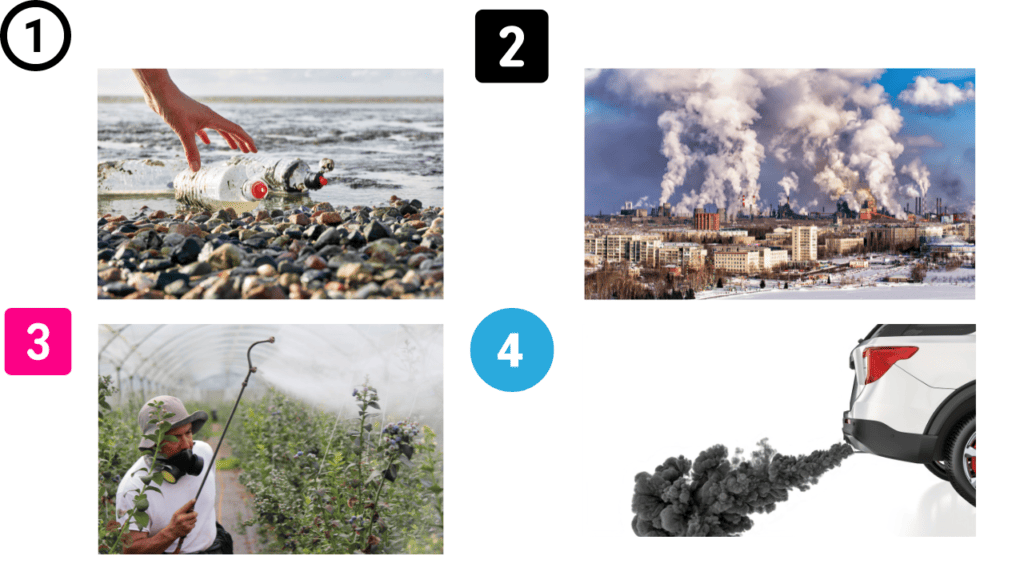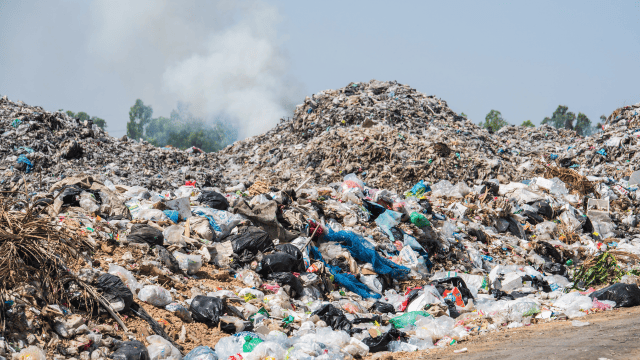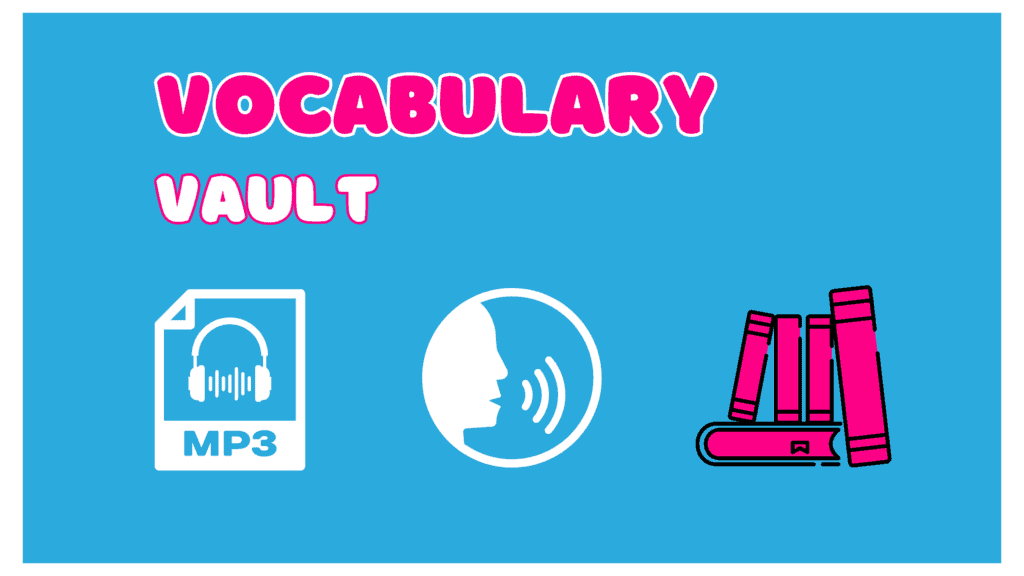IELTS Speaking Lesson about Pollution
👇 Take this lesson with you! 👇
Table of Contents
IELTS Speaking vocabulary: Pollution
Fill in the gap with one word
- Pollution is where we make the environment ______ and ______ to use.
- Plastic and chemicals are two of the worst __________
See answers
- Pollution is where we make the environment dirty, filthy, bad, and unsafe, unhealthy to use.
- Plastic and chemicals are two of the worst pollutants, sources, factors
Pollution (n.) Uncountable
- Damage caused to the environment (water, air or soil) by harmful substances
Air pollution dropped to an all time low during the pandemic
- Environmental pollution
- Air pollution
- Water pollution (lakes, sea, rivers)
- Land pollution (soil)
OR
- The harmful substances that cause the damage (plastics, smoke, radiation)
Plastic pollution is killing our seas and rivers.
- Noise pollution
- Light pollution
- Radioactive pollution
- Plastic pollution
Read the facts about the different types of pollution here.
Pollutant (n.) Countable
The substance that pollutes
Can you name the following pollutants?

See answers
- Plastic
- Smoke / Fumes / chemicals/waste gas
- Carbon monoxide (CO)
- Carbon dioxide (CO2)
- Pesticides, chemicals
- Exhaust fumes (vehicles), fuel/gas/petrol emissions, CO2
Other pollutants
Sewage (n.) uncountable
= human waste and waste water
Chemicals
- Sulphur Dioxide (SO2)
- Mercury
- Lead
Pollute (v.)
- To make something harmful, usually by adding chemicals.
- To contaminate
Plastics are polluting the water supply
Plastics are contaminating the water supply
Different ways of saying ‘Rubbish’ or ‘Waste material’
- litter
- waste
- rubbish (UK)
- garbage (US)
- junk (US)
- refuse
- debris
- leftovers (just for waste food)
- rubble (only from a destroyed building; cement, stones, bricks)
- Household rubbish
- Industrial waste
A dump / a landfill (these are only places)
Waste from the body we can call; excrement, poo, faeces, (solids) pee, wee, urine, (liquids)
Consequences of Pollution
- It can lead to _____ (noun)
- It can provoke _____ (noun)
- It can cause _____ (noun)
- It can trigger _____ (noun)
To trigger = to make something happen
Air pollution can lead to ______
- Respiratory (=breathing) problems
- Lung cancer
- Death
Water pollution can provoke ________
- Contamination of the food chain
- Infant mortality
Soil pollution can cause ________
- The land to become unsuitable for farming
- Chronic health problems

Listening bingo
1) Listen to this person talking about the causes of pollution. What does he say are the 2 main causes of pollution ?
See answers
What are the 2 main causes of pollution?
- Aeroplanes / airplanes
- Traffic, especially cars
2) Listen again and mark a box when you hear the exact words in it.
If you mark 3 in a row, that’s BINGO!

See answers

3) Now watch and note any useful collocations!
Listening Bingo – Full Script
See answers
When it comes to air pollution, to my mind, (= in my opinion) airplanes must be the biggest polluters.
Let’s face it (=let’s be honest), they are causing huge damage,
churning out (=produce something bad) greenhouse gases, like CO2 into the air, contributing to global warming.
This became crystal clear (=very clear) during the pandemic when there was no air travel and we saw air quality around the world shoot up (=to go up a lot)
The other guilty party, as far as I can make out (to make out = to see or understand), is traffic, especially cars.
I know some cities have introduced measures to curb (=to reduce) inner city traffic, but by all accounts (=from all the evidence) they have had limited success.
I reckon this problem is hugely exacerbated (=is made much worse) my more and more families aspiring to own two cars which is clearly not helping matters.
I suppose the gradual uptake (the uptake = the act of taking or accepting something) of electric cars will mitigate (=to reduce) this in the long run (=the long term), but yeah, those are the 2 big ones for me.
Listen to more about the causes of pollution on this WHO podcast.
IELTS Speaking idioms to talk about pollution
To turn a blind eye
= To ignore a problem or something that is wrong
We know flying causes huge air pollution but we all seem to turn a blind eye to it.
Something is a drop in the ocean
= too little, not enough
The action taken by our government to reach net zero carbon emissions is a drop in the ocean.
The tip of the iceberg
= A small part of the problem
The increase in sicknesses we are seeing due to air pollution is just the tip of the iceberg.
Interesting Quotes
- ‘The greatest threat to our planet is the belief that someone else will save it.’ Robert Swan
- ‘We do not inherit the earth from our ancestors, we borrow it from our children.’ Native American Proverb
IELTS Speaking question part 3: Model answer
- Watch the answer to the following question and note any interesting collocations.
Is there more air pollution now than in the past?
IELTS Speaking question: Useful phrases
Is there more pollution now than in the past?
I guess it depends on the kind of pollution, the country and whether we are talking about urban areas (=city areas) or rural areas (=countryside area)
Statistically speaking (=according to the data), certainly in the USA and most of Europe, then air pollution has certainly gone down.
I think In the last thirty years or so, the air quality in those countries has increased.
The problem is, in many developing countries it is far worse than before (=much worse than before).
Levels of pollution are rising, especially air pollution, as societies are becoming more prosperous (=rich, wealthy), and the demand for cars and maybe international travel goes up, and so does air pollution.
So I guess on a global scale, we still have a long way to go (=we still need to do a lot more).
Statistics on Pollution differences today and in the past
Pronunciation Files For Vocabulary From My Best Live Lessons
Use Words EASILY in English Conversations!
More Free Lessons
If you liked this lesson, leave a comment below!
There are more lessons you can follow in the links below too.
FRIENDS in IELTS Speaking. Powerful idioms and expressions to talk about friends.
FEELINGS in IELTS Speaking Vocabulary you need to describe a range of different feelings, as well as talking about topical issues such as mental health
HOUSEWORK in IELTS Speaking. Useful collocations and vocabulary to help you discuss about housework.
SCIENCE in IELTS Speaking Learn vocabulary and idioms to talk about different branches of science you like and get ideas to talk about.

